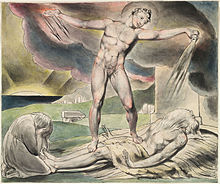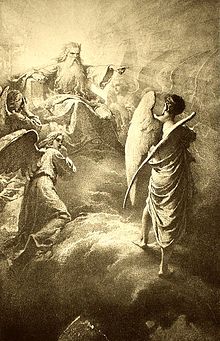Satan
![]()
This article is about the supernatural spirit being. For other meanings, see Satan (disambiguation).
Satan (also Satanas; Hebrew שָׂטָן Satan "adversary"; Masoretic Hebrew: Śāṭān; Koine Greek: Σατανᾶς Satanâs; Latin: satan (m, indeclinable) and satanas (-ae, m.) or Satan and Satanas; Aramaic: סטנא, Sāṭānā; Arabic شيطان Shaitan, DMG Šaiṭān) is a term denoting one or more spirit beings, often angels endowed with functions malevolent to man. It has its origins in Jewish monotheism and contains ancient Persian religious influences, especially Zoroastrianism. Satan is primarily the accuser in the divine court, testing the religious integrity of people and accusing them of sins, as is known, for example, from the biblical books of Job and Zechariah. In the Lives of Adam and Eve and Islamic literature, Satan is banished from heaven for refusing to bow down before the first man. In the Ethiopian Book of Enoch, a whole host of Satans is mentioned, both as tempters and as punishing angels. The idea of a multitude of Satans also found its way into the Qur'an. Later, Satan was associated with meanings such as fallen angels rebelling against God, the embodiment of evil; the devil or idols (false god).

The Trial of Job: Satan Pours Out the Plagues on Job (William Blake)
Etymology and alternative names
The Hebrew noun שָׂטָן, Satan ("adversary" or "accuser"), and the Arabic noun شيطان Shaitan, DMG Šaiṭān derive from the Northwest Semitic root sṭn, meaning "to be hostile" or "to accuse".
Satan concept of Christianity
See also: Devil
According to Christian understanding, interpretation and Bible translations, Satan is often used as a proper name and identified with the devil. This is considered to be a particular angel who rebelled waywardly against God and was cast out of heaven as a fallen angel. Occasionally the devil and Satan are distinguished. Satan is then considered to be the proper name of the devil's most faithful vassal.
Old Testament
According to Christian ideas, the Satan of the Old Testament (OT) is the tempter of mankind. The Hebrew term "Satan" (שטן, Sin-Teth-Nun) means "adversary" or "opponent". The term "Satan" is also used in the OT for people (Num 22:22;32 EU; 1 Sam 29:4 EU; 1 Kings 5:18 EU; 11:14, 23, 25 EU; Ps 109:6 EU; as verbs in the sense of "hostility" in Ps 38:21 EU; 71:13 EU; 109:4, 20, 29 EU). With regard to the New Testament (Rev 12:9 [1] 2 Cor 11:3 [2]), Satan was identified with the serpent in the Garden of Eden and, speaking through it, had caused Eve to sin.
The name Lucifer was given to Satan by misinterpreting the Latin word, a proper translation from Hebrew, as a proper name. It refers to Isa 14,12-14 EU. While the allegory of a setting morning star (Venus) appearing there has nothing to do with a fallen angel, but refers to the fall of the Babylonian empire and its king Nebuchadnezzar II, who is compared to the morning star outshone by the sun representing Israel, some representatives of the early church (including Origen) saw a parallel to Jesus' statement in Luke 10:18 EU and typologically identified the king and the morning star with Satan.
New Testament
Satan is a proper name in the New Testament and denotes a supernatural entity with demonic powers. According to the Christian understanding this one acts according to free will, but always remains inferior to the power of God. Satan is the tempter in the various gospels and the cause of sickness, possession and death.
Satan is also known in the New Testament as the ruler of this world (John 16:11 EU), Beelzebub, and Beliar. The synoptic gospels record an encounter between Jesus and Satan in the wilderness. Satan promises, if Jesus kneels before him, the kingdoms of this world, implying that they are subject to him. In (John 12:31 EU) Satan is described as the "prince of this world" who will be cast out at the last judgment. The name Beelzebub means "lord of the flies" and in the Hebrew Bible refers to an ancient god of the Philistines. It appears in the New Testament as a synonym for Satan, but here it apparently reflects the usage of the Jewish opponents (Mt 10:25 EU; Mt 12:24-27 EU).
In a modified form the idea of the fallen Satan is found again in Revelation, where a battle is reported in the course of which Satan is thrown out of heaven (Rev 12:8-9 EU cf. also Lk 10:18 EU; Jn 12:31 EU) and pushed with chains into the abyss. The abyss (Abaddon) is personified as an angel and as Apollyon also conceived as an angel of punishment, but no longer functions as an executive power approved by God, but as the author of sin. After 1000 years Satan rises again to attack the righteous, only to be pushed into the lake of lava and cruelly punished at the end (Rev 20,10 EU).
Christianity teaches that Satan hates people and does everything he can to lead them astray and separate them from God. In church history, people of non-Christian faith (including heretics, apostates or atheists, Jews and Muslims) have repeatedly been considered and persecuted as powers of Satan or manifestations of the devil.
sathanae process
The "Trial of Satan" is about a fable, from the 13th to 14th century, in which Satan, as Advocatus Diaboli, accuses mankind for its sins. There is no single version of this fable, as it has been revised several times. In the Satanic Trials, Satan demands a crushing punishment for mankind and brings a legal action. The Virgin Mary appears as the people's defender, who ultimately moves the judge Jesus Christ to compassion through tears. As Satan correctly notes in the fable, Mary should not have been admitted to the trial as a procurator, and a judge should have condemned mankind. The fable gives the appearance of a formal trial, but is both in design and in essence a dogma intended to illustrate. It shows that through the resurrection of Jesus Christ man was delivered from the power of the devil for all time. In a later version, it is not man, but Jesus instead, who is accused, as having snatched the souls of men from the devil. Also here Satan loses the trial.

The Banishment of Lucifer from Heaven, Mihály Zichy (1887)
.jpg)
The Temptation of Christ, painting by Ary Scheffer (1854)
Search within the encyclopedia